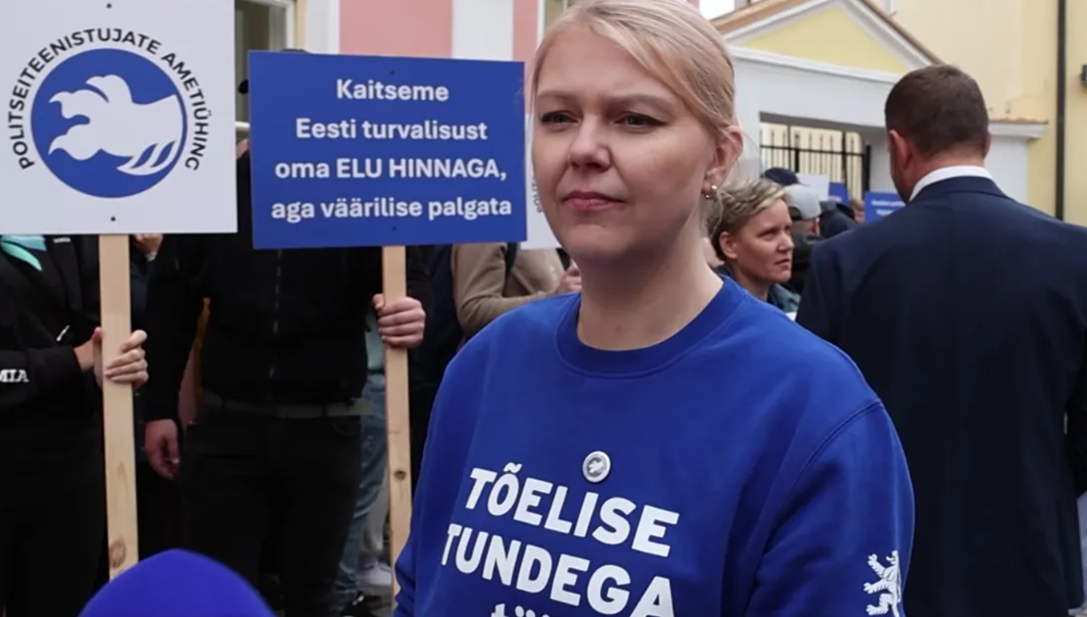
Enel Kuiv, General Secretary of the Police Officers' Trade Union, hopes that this morning's demonstration in front of the Stenbock building in Tallinn will make police officers and border guards listen to their voices in a situation where they have been waiting for a pay rise for ten years.
In your speech at the demonstration, you said that police officers have never come out on the streets like this before. What has changed since then?
Today, the police are in a crisis that has long been signalled and waved from afar, and has been talked about for years. The crisis in policing is here and will get worse in five years if we are not listened to today.
Over the next five years, more than 1,500 police officers and border guards are expected to leave the police force - we cannot do without them. Every next crisis the country faces will always be about police officers, and we desperately need these young colleagues.
Most of those who are leaving the police are retiring, but the young people who are coming up today and could be our professional, loyal colleagues for years to come, unfortunately cannot do so on their current salaries. Young people are at the beginning of their lives: they want to start their own families, they want a secure place to live and a bank loan or to rent a decent home. They can't do this if they take home less than €1500. Without a pay rise, we will not see this exit crisis resolved in any way.
Clearly, we need police officers, but how do we attract young people into an area where there is a crisis?
The young people who come to study with us have their hearts in the right place - they are very brave. We don't have a problem with filling school places, but it gets difficult when young people graduate, go to work and realise that working nights or public holidays brings home a pretty poor wage.
In the last five years, almost 500 young police and border guards have left the EU. We can see that this number - a few hundred people a year - may be here to stay.
Ministers were handed a message sheet today. What did it say?
The Police Officers' Union drew attention both to this crisis and to the need for extra money from the state. Without state support, we cannot solve the staffing crisis.
Our data and forecast is pretty bleak - the staffing crisis is only going to get worse for us over time.
Do you think this crisis will be solved and police salaries will rise?
We are optimistic, even though we have been asking for a pay rise for almost a decade, and pointing out that the police officer's duties and pay must be compatible. Perhaps this time we will be heard - the country needs police officers and border guards badly.
Police Officers' Trade Union's views for next year's state budget debate
Salary is not commensurate with the duties of the job
The job of a policeman is dangerous and stressful. The expectations and demands are higher than in many other jobs, but the pay is several hundred euros less than the average in Estonia. This gap is growing.
A policeman who goes to the scene of a road accident during a shift, comforts a child victim of a crime, takes pictures of the injuries of a victim of violence, takes a report of the death of a loved one, collects evidence of a crime at the scene and provides first aid to a patient in need of ambulance care, will net less than €1500.
The lowest-paid posts account for 43% of police posts
On 1 January 2025, there will be 3,688 police officers in Estonia. There is no possibility to increase salaries from the budget of the agency.
Young police and border guards leave the service because of net salaries below €1500
After a short period of service, around a hundred police officers and border guards leave their jobs every year. However, the number of graduates entering the service is not enough to compensate for this loss.
There is a deepening staff crisis in the police
By 2030, the country is expected to lose more than 1,500 police officers, most of whom will retire.
Wages do not ensure sufficient replacement rates
A young police officer entering the service is at a great economic disadvantage compared to his or her peers. Without a pay rise, it becomes even more difficult to make ends meet, and even a young person with a heart for work leaves to make a living. A growing problem is how to fill border guard posts. At the same time, the resources of police officers and border guards are indispensable in times of crisis.
Other employers pay more
The PPA competes with the prosecutor's office, prisons and the Tax and Customs Board, where the work is comparable to that of a police officer, but the salaries are sometimes too low.
We expect the Government of the Republic and the Riigikogu to provide extra money for a pay rise to bring the police officer's salary to 1.2 times the average Estonian salary in 2026.
Source: PM